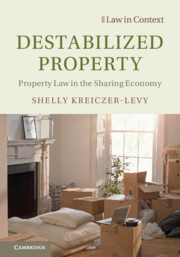Book contents
- Reviews
- Destabilized Property
- The Law in Context Series
- Destabilized Property
- Copyright page
- Dedication
- Contents
- Acknowledgments
- 1 Introduction
- 2 Stability and Property Use
- 3 The Decline of Stability in the New Millennium
- 4 The Rise of the Access Economy
- 5 Access as an Alternative to Ownership
- 6 Fragmentation of Intimate Property
- 7 Evaluating Flexibility in Property Use
- 8 What’s Next? The Future of the Access Economy
- 9 Conclusion
- Index
- Series page
7 - Evaluating Flexibility in Property Use
Published online by Cambridge University Press: 25 October 2019
- Reviews
- Destabilized Property
- The Law in Context Series
- Destabilized Property
- Copyright page
- Dedication
- Contents
- Acknowledgments
- 1 Introduction
- 2 Stability and Property Use
- 3 The Decline of Stability in the New Millennium
- 4 The Rise of the Access Economy
- 5 Access as an Alternative to Ownership
- 6 Fragmentation of Intimate Property
- 7 Evaluating Flexibility in Property Use
- 8 What’s Next? The Future of the Access Economy
- 9 Conclusion
- Index
- Series page
Summary
This chapter develops the necessary conditions for the vision of property flexibility to flourish and become a valuable normative alternative. It returns to the themes raised in previous chapters, and advances three main arguments. First, it offers a robust normative account of the institutional choices for access, arguing that peer-to-peer markets offer considerable benefits from a flexibility perspective. Instead of the current regulatory support for commercial access, the law should consider regulatory means that encourage the peer-to-peer model of access. The problem with this endorsement of the peer-to-peer model is the power of the platform. Second, this chapter calls for a better conceptualization of the role of platforms as powerful agents constituting the activity. It suggests two possible reforms: the promotion of platform alternatives that have some public oversight, and the regulation of platforms as market-constituting fiduciaries. Finally, the chapter evaluates the comparative normative value of each vision, stability and flexibility, and offers guidelines for a legal scheme that recognizes both the subversive and the ideal.
Keywords
- Type
- Chapter
- Information
- Destabilized PropertyProperty Law in the Sharing Economy, pp. 134 - 163Publisher: Cambridge University PressPrint publication year: 2019

